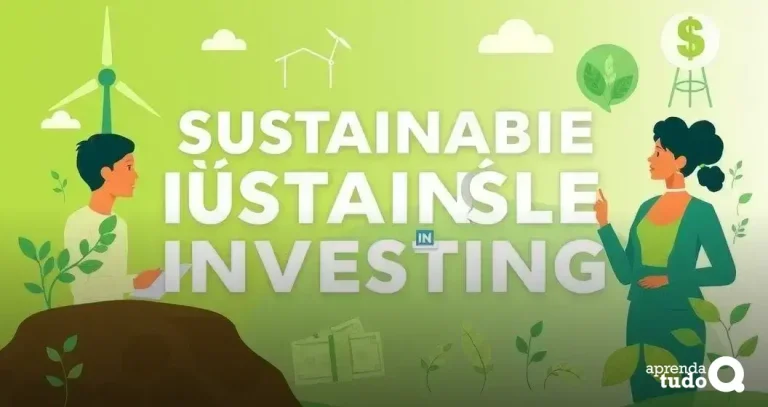Sustainable investing for beginners is reshaping the financial landscape. It focuses on generating positive societal impact while providing attractive returns. More investors are seeking to align their portfolios with their values.
This approach helps beginners make informed investment choices that honour both personal ethics and financial goals. It’s not just about profit; it’s about creating a better future through responsible investments.
Curious about how sustainable investing can work for you? Keep reading to discover the essential steps to get started!
Understanding Sustainable Investing
Understanding sustainable investing is key for anyone looking to grow their wealth while making a positive impact. At its core, sustainable investing involves choosing investments that not only aim for financial returns but also help the environment and society. This means putting your money into companies that practice good governance and care for the planet.
Many people are surprised to learn that sustainable investing can also be profitable. Studies show that companies focused on sustainability often outperform their competitors. By supporting businesses that make responsible decisions, investors can enjoy healthy returns while contributing to a better world.
For beginners, it’s important to know that sustainable investing doesn’t require a lot of expertise. Anyone can start by looking at mutual funds or exchange-traded funds (ETFs) that focus on social responsibility. This allows investors to diversify their holdings while remaining aligned with their values.
Benefits of Sustainable Investments
One of the biggest benefits of sustainable investments is the potential for strong financial returns. Companies that focus on sustainability often perform better over time. Investors who choose sustainable options can enjoy profits while supporting businesses that prioritise the planet and community.
Another significant benefit is the positive impact on society and the environment. Sustainable investments encourage companies to adopt practices that protect natural resources and promote social equity. This means your money helps create a world that is healthier and fairer for everyone.
Finally, sustainable investing can improve personal satisfaction. Many investors feel a sense of pride knowing their money is going towards businesses that align with their values. When you invest sustainably, you aren’t just building wealth for yourself; you’re contributing to a better future for generations to come.
Types of Sustainable Investments
There are several types of sustainable investments that beginners can consider. One popular option is green bonds. These are fixed-income securities that raise money specifically for environmental projects. By investing in green bonds, you support initiatives like renewable energy and clean water access.
Another type is socially responsible mutual funds. These funds pool money from many investors to invest in a variety of companies that meet certain ethical standards. They typically focus on companies that have strong records on issues like environmental protection, workers’ rights, and community engagement.
Finally, impact investments seek to generate measurable social or environmental benefits alongside financial returns. This type of investment can be in many areas, such as affordable housing, education, or healthcare. With impact investing, investors can make a difference while also earning a profit.
How to Start Investing Sustainably

Starting to invest sustainably is easier than it seems. First, you should define your goals. Think about what values are important to you, such as protecting the environment or supporting fair trade. Knowing your priorities will help you choose investments that align with your beliefs.
Next, consider researching sustainable funds or stocks. Look for funds that have a track record of responsible investing. Check out their portfolios to see the types of companies they support. Websites and apps make it easy to find options that meet your criteria.
Finally, don’t hesitate to seek professional help. Financial advisors with expertise in sustainable investing can guide you. They can help you create a tailored plan that matches both your financial goals and ethical values, ensuring that your investments truly reflect what you care about.
Key Principles of Sustainable Investing
One key principle of sustainable investing is the focus on environmental, social, and governance (ESG) factors. This means considering how companies impact the environment, treat their employees, and manage their operations. Investments are more likely to succeed when companies follow good practices that promote sustainability.
Another important principle is long-term thinking. Sustainable investing is not about quick profits. Instead, it aims to create lasting value over time. Investors should look for companies that are committed to sustainable practices, as they can provide stable returns while helping the planet.
Finally, active ownership plays a vital role in sustainable investing. This means shareholders take an active part in how companies operate. By voting on important issues at shareholder meetings, investors can encourage companies to adopt better practices, aligning their operations with sustainable values.
Common Misconceptions about Sustainable Investing
One common misconception about sustainable investing is that it is only for rich people. Many believe that you need a lot of money to start investing sustainably. In reality, there are affordable options available. Even small amounts can be invested in sustainable funds or stocks, making it accessible for everyone.
Another myth is that sustainable investing will always give lower returns. Many think that choosing eco-friendly options means sacrificing profit. However, research shows that sustainable companies often perform just as well, if not better, than traditional ones. Investors can support good practices and still see strong financial growth.
Lastly, some people assume that sustainable investing is too complicated. They worry about needing detailed knowledge of environmental issues. In fact, there are plenty of resources and professionals to help. With proper guidance, anyone can navigate sustainable investing and make informed choices that align with their values.
Evaluating Sustainable Investment Options
When evaluating sustainable investment options, the first step is to check the company’s track record. Look for businesses that have demonstrated a commitment to sustainability over time. This includes their practices regarding environmental protection, community involvement, and employee well-being. Companies with a strong history are often more reliable investments.
Next, consider the performance of sustainable funds. Research how these funds have done in the past. Many investment platforms provide information about returns and risks. This data helps you understand if a particular fund aligns with your financial goals while also supporting sustainability.
Lastly, think about the fees and costs associated with investing. Some sustainable investments may have higher fees, but balancing costs with overall value is vital. Take the time to compare different options and choose investments that offer both financial growth and positive impact without breaking the bank.
Future Trends in Sustainable Investing

One future trend in sustainable investing is the rise of impact investing. More investors are looking for ways to make a difference while still earning a profit. This trend encourages funds to invest in projects that not only provide financial returns but also lead to positive social or environmental outcomes.
Another growing trend is the integration of technology in sustainable investing. Advanced tools, like artificial intelligence and big data, are helping investors analyze companies’ impacts better. These technologies allow for smarter decision-making, making it easier for investors to align their portfolios with their values.
Finally, there is a shift toward greater transparency in the sustainable investing space. Companies are being held accountable for their practices. This means they need to report their environmental and social impact more clearly. Transparency helps investors make informed choices and ensures that their investments truly reflect sustainable practices.






